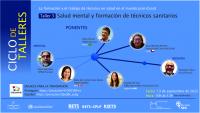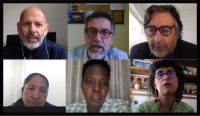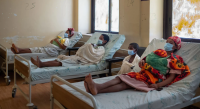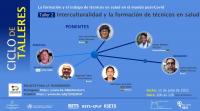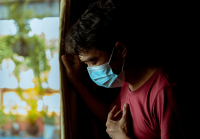You are here
News
-
09/14/2022 - As the number of weekly reported deaths from COVID-19 plunged to its lowest since March 2020, the head of the World Health Organization (WHO) said on Wednesday that the end of the pandemic is now in sight.
-
09/01/2022 - The upcoming event of the Cycle of Workshops The training and work of health technicians in the post-Covid world will be held on Tuesday, September 13, at 10 a.m. (Brasilia) and will deal with mental health. The current executive secretary of the Andean Health Organization - Hipólito Unanue Agreement (Oras-Conhu), María del Carmen Calle Dávila, will open the event, whose speakers will be: Dênis Petuco (EPSJV/Fiocruz - Brazil), Jesus Morales Romero (Universidad Central de Chile) and Jorgelina Diorio (Universidad de Buenos Aires and Intercambios Asociación Civil - Argentina). The workshop will be transmitted in Portuguese and Spanish. A certificate of participation will be sent to those who wish to attend.
-
08/30/2022 - Newly established global estimate on hygiene reveals the risk of disease spread and infections to patients and health care providers. Around 3.85 billion people use these facilities, putting them at greater risk of infection.
-
08/15/2022 - A group of global experts convened by WHO has agreed on new names for monkeypox virus variants, as part of ongoing efforts to align the names of the monkeypox disease, virus and variants – or clades – with current best practices. The experts agreed to name the clades using Roman numerals.
-
08/04/2022 - Healthy life expectancy in the African region increased by an average of 10 years per person between 2000 and 2019, according to a new report from the World Health Organization, WHO. This increase is greater than in any other region of the world during the same period. The study also notes that the impact of the Covid-19 pandemic may threaten these gains.
-
07/25/2022 - Con más de 16.000 casos de viruela símica reportados en 75 países del mundo desde principios de mayo de 2022, el Director General de la Organización Mundial de la Salud (OMS), doctor Tedros Adhanom Ghebreyesus, declaró que el brote de la enfermedad constituye una emergencia de salud pública de importancia internacional.
-
07/14/2022 - With the theme 'Interculturality and the training of health technicians', the second workshop of the cycle on the training and work of health technicians in the post-Covid world was held on July 12th. The event was opened by Hernán Sepúlveda, Human Resources for Health advisor of the Pan-American Health Organization's Sub-Regional Program for South America (PAHO/WHO-SAM), and also brought together three guests for debate: Herminia Llave Nina (Bolivia), Janete Ismael Mabuie Gove (Mozambique) and Ana Lúcia Pontes (Brazil). The meeting was presented and mediated by Sebastián Tobar, advisor of the Center for International Relations in Health at Fiocruz (Cris/Fiocruz), and Carlos Eduardo Batistella, coordinator of International Cooperation at the Joaquim Venâncio Polytechnic School of Health (EPSJV/Fiocruz).
-
07/12/2022 - The 2022 edition of The State of Food Security and Nutrition in the World (SOFI) report presents updates on the food security and nutrition situation around the world, including the latest estimates of the cost and affordability of a healthy diet. The report also looks at ways in which governments can repurpose their current support to agriculture to reduce the cost of healthy diets, mindful of the limited public resources available in many parts of the world.
-
07/08/2022 - The second event of the workshop cycle 'The formation and work of health technicians in the post-Covid world', with the theme of interculturality and the formation of technicians, will be held on July 12th (Tuesday), at 10 am (Brasilia time). The theme has been gaining importance because of the certainty that understanding the cosmovision of diverse populations is essential to understanding the social production of health/illness/care in each context. For this, it is also necessary to enable health personnel - institutional and community - to engage in a dialogue of knowledge, promoting the possibility of timely, culturally relevant, and non-discriminatory health care. Likewise, the theme of interculturality must be included in the design of curricula for technical and professional careers in health care. Join us in the debate about this issue!
-
06/30/2022 - More than 90,000 cases of acute COVID-19, including post COVID-19 condition from countries in the Americas are now listed in a Global Clinical Platform for COVID-19, which collects data and descriptions to support research and to share guidance on clinical services for patients.


